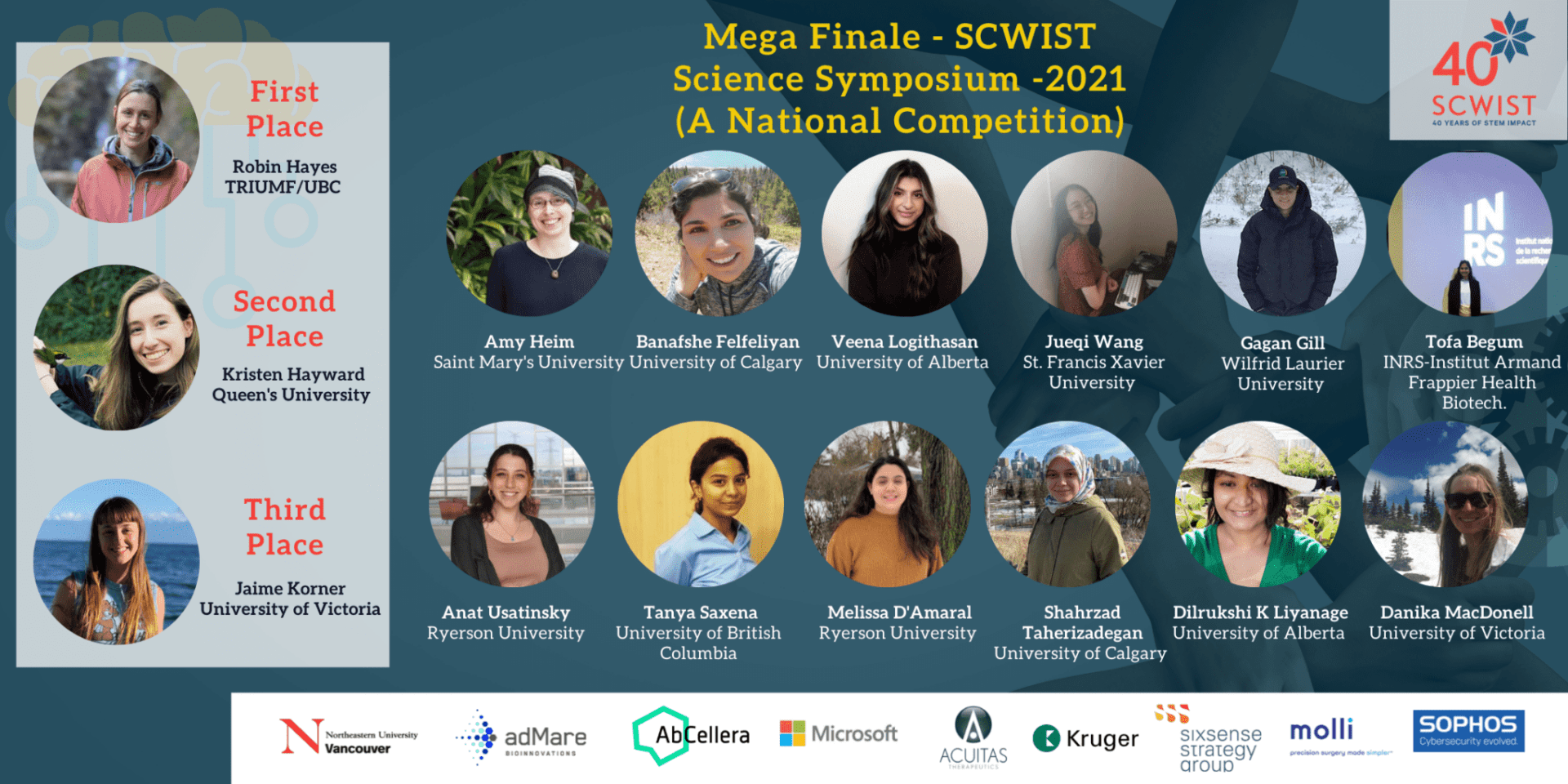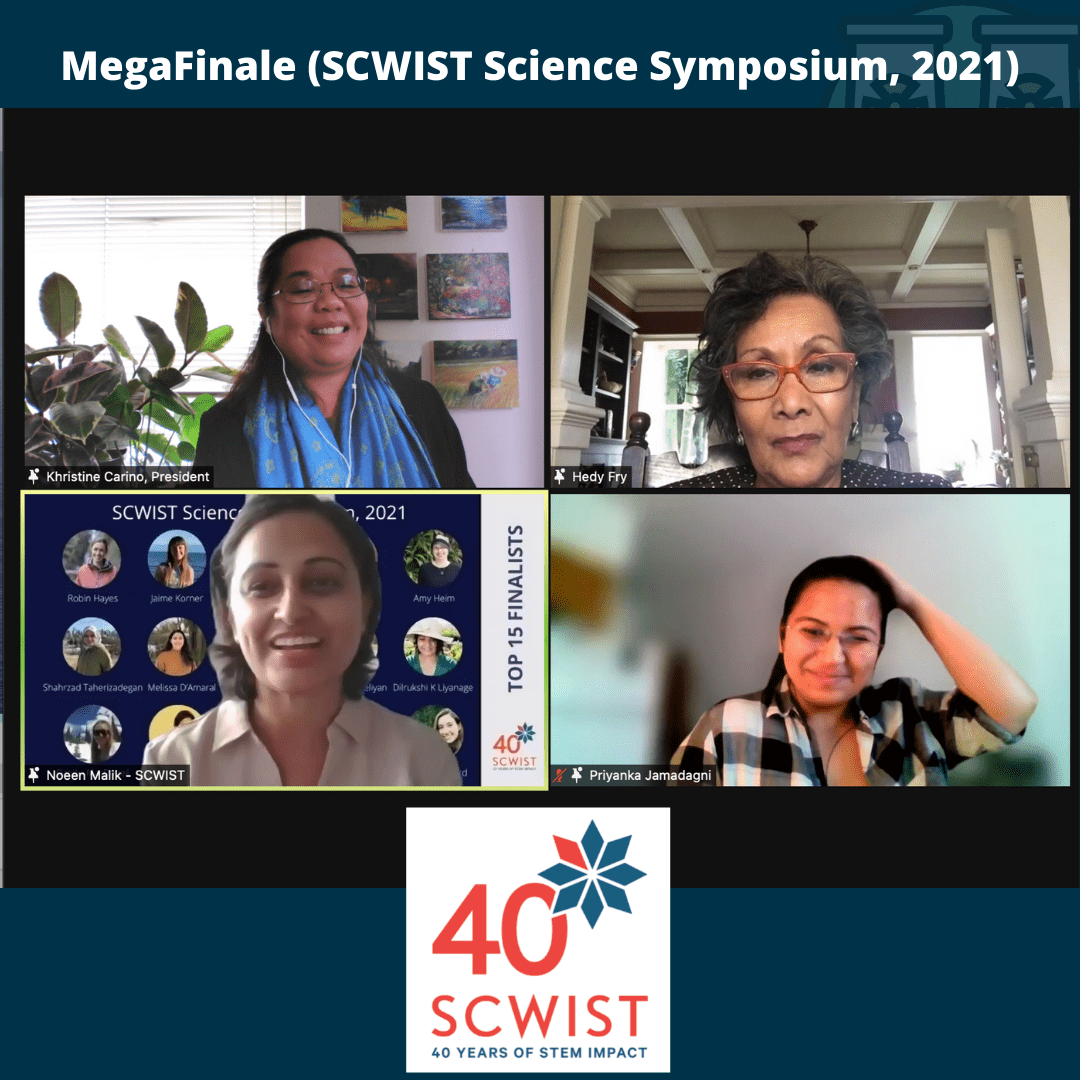SCWIST Science Symposium Winners Announced!
Back to Posts
For the past 15 weeks, young female scientists have been presenting their work to a panel of judges and onlookers at the SCWIST Science Symposium.
The students, still completing their undergraduate degrees, masters and PhDs, have often never published a paper or had the opportunity to present their work before.
“When I was in the lab, and I saw conferences and opportunities happen, it was always postdocs or senior scientists who got the privilege to attend and present their work. There are far fewer opportunities for undergraduate and graduate students, especially for those working in labs with less funding,” said Noeen Malik, the creator of the Symposium and Chair of the event. “Young scientists are key figures in completing research projects, but you seldom see their names gracing the top of research papers or even getting some credit at all. I wanted to create an opportunity for these young scientists to present and receive recognition for their work.”
The SCWIST Science Symposium was open to young female scientists from across Canada, and 88 students from 38 universities across nine provinces applied. After a competitive elimination round, the number was brought down to the 15 finalists who, one by one, presented their work throughout the summer.

The Science Symposium culminated in a final event on September 29th, with a keynote speech from the honourable Dr. Hedy Fry, full of advice and cheer for the young scientists. Dr. Fry, who immigrated to Canada in 1970 and began practicing family medicine at St. Paul’s Hospital. She quickly became a leader in the medical community, serving as president of the Vancouver Medical Association, BC Medical Association and the Federation of Medical Women.
“It’s time for us as women to take off the restraints that have held us back — the socialization and mythology — and show that we can excel in [STEM],” said Dr. Fry during her speech. “And I’d like to emphasize to all of you who are participating in this Symposium that it’s really important to take this time to learn from each other. Networking is key, as is finding good mentors who will tell you the truth about yourself, help you move forwards and tell you where you could do better.”
“And one of the most important things I wanted to say to everyone here is that you don’t have to begin deciding that you know where you want to go and what you want to do right away,” she added. “You must be open to exploring. You must have curiosity to see how many other things there are that you may or may not go to. I started one place and I ended up in another!”
And finally, after much anticipation, Dr. Fry announced the winners:
- Robin Hayes claimed the first-place prize and $1,500 for her presentation, Measurements of Higgs Boson Cross-Sections at the Large Hadron Collider
- Kristen Hayward claimed the second-place prize and $1,000 for her presentation, New genomics for non-invasively monitoring Canada’s polar bear populations
- Jamie Korner claimed the third-place prize and $750 for her presentation, Artificial cells-on-a-chip for drug permeability prediction
All other finalists received a $150 honoraria for their time and presentations.

When asked why she applied for the Science Symposium, Kristen Hayward was quick to answer.
“The Science Symposium was a great opportunity to network with other women in science, learn more about research being done in Canada and also share my own work — which I’m really excited about!” she said. “Overall it was an amazing platform for women to empower women and find community.”
“I always find that presenting my research, either in a written form or orally, causes me to think more deeply about the work I’ve been doing,” added Robin Hayes. “The questions from the judges also prompted me to consider various aspects of my research that are otherwise easy to take for granted. Both of these aspects of the Symposium were really valuable.”
“I would definitely advise future students to apply!” finished Jamie Korner. “And make sure to prepare your presentation well and enjoy the chance to discuss your work with other researchers.”
Women in STEM often lack professional role models and mentorship in university, and once they enter the workforce, they often struggle to gain recognition of promotions in male-dominated fields.
“The Symposium is one act amongst many to help amplify their voices and share the story of their successes,” said Ashley van der Pouw Kraan, the Symposium Vice-Chair. “It was a pleasure to see all 15 presentations, and I know each of the Science Symposium participants have a bright future ahead of them.”
The SCWIST Science Symposium was made possible thanks to the support of Northeastern University Vancouver, AbCellera, adMare Bioinnovations, Microsoft, Kruger, Actuitas Therapeutics, Sixsense Strategy Group, Molli Surgical and Sophos. Learn more about the Science Symposium.
Watch the full event: